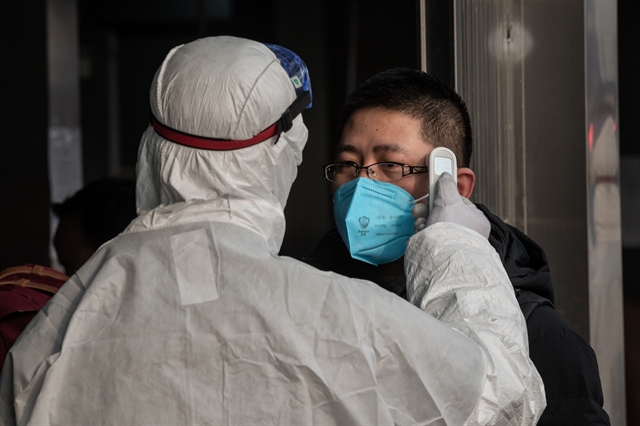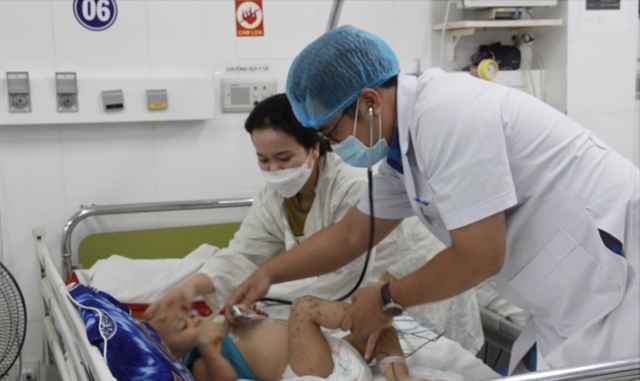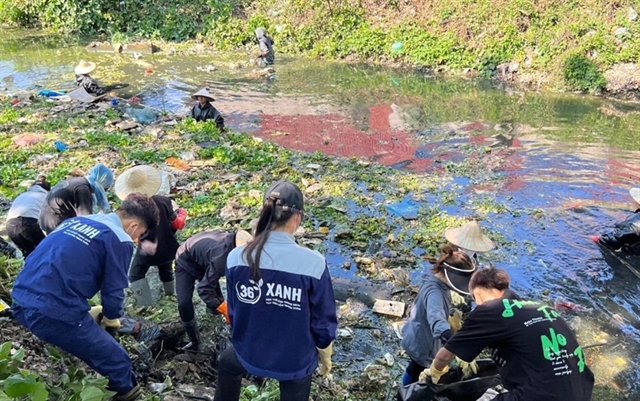


|
| A security personnel wearing protective clothing to help stop the spread of a deadly virus which began in Wuhan, checks the temperature of a man at a subway station entrance in Beijing on January 27, 2020. — AFP/VNA Photo |
GENEVA — The World Health Organisation said Monday it remained unclear if the deadly coronavirus spreading in China and beyond is contagious during its incubation period, before symptoms appear.
The virus, which can cause a pneumonia-like acute respiratory infection, has in a matter of weeks killed more than 80 people and infected some 2,740 in China, while cases have been identified in more than a dozen other countries.
In a fresh report on the new virus, known as 2019nCoV, the UN health agency said current estimates put the incubation period for the virus at between two and 10 days.
"Understanding the time when infected patients may transmit the virus to others is critical for control efforts," WHO said.
It did not immediately confirm assertions made by Chinese authorities that people who are infected can spread the disease before they show any symptoms of fever or respiratory difficulties.
"Detailed epidemiological information from more people infected is needed to determine the infectious period of 2019nCoV, in particular whether transmission can occur from asymptomatic individuals or during the incubation period," it said.
WHO last week stopped short of declaring the outbreak a public health emergency of international concern – a rare designation used only for the worst outbreaks that would trigger more concerted global action.
But the world body admitted Monday it had made an error in its risk assessment for the deadly virus in several reports last week, acknowledging the global risk was "high" rather than "moderate".
The virus has caused global concern because of its similarity to Severe Acute Respiratory Syndrome (SARS), which killed hundreds across mainland China and Hong Kong in 2002-2003 and was also traced to the wild game trade.
The new virus is believed to have jumped to people from animals in a Wuhan market, but it has since begun spreading between humans, although the exact mode of transmission has yet to be confirmed.
As with SARS and another deadly coronavirus known as Middle-East Respiratory Syndrome, or MERS, WHO suggested that the new virus could be spreading through droplets, for instance when people sneeze or cough, or through direct contact with infected people or with objects they have touched.
To reduce the risk of infection, WHO stressed the need to avoid close contact with people suffering from acute respiratory infections, frequently wash one's hands, and avoid unprotected contact with farm or wild animals.
The agency also stressed the importance of practising so-called cough etiquette, including maintaining distance and covering coughs and sneezes with tissues.
WHO has not recommended any international travel or trade restrictions, but does call for high levels of vigilance, including encouraging airport exit and entry screening for passengers leaving affected areas to check for fever and coughs.
China's capital reports first virus death
China's capital on Monday recorded its first death from a deadly coronavirus as it struggles to contain a rapidly spreading disease that has sparked global alarm, with countries scrambling to evacuate their citizens from the epicentre of the epidemic.
The fatality in Beijing raises the death toll from the new virus to 82, with more than 2,700 people infected across the nation.
Cases have been identified in more than a dozen other countries, including the first confirmed patients in Canada and Sri Lanka.
The United States urged its citizens to "reconsider" all travel to China and told them not to go to central Hubei province, where the pneumonia-like virus emerged. Mongolia closed its vast border to vehicles from China.
In a sign of mounting official concern, Premier Li Keqiang visited ground zero to oversee containment efforts in Wuhan, a city of 11 million people where the disease first appeared late last month.
The government has sealed off Wuhan and other cities in Hubei province, effectively trapping tens of millions of people including thousands of foreigners, in a bid to contain the virus as the Lunar New Year holiday unfolds.
China decided to extend the holiday, initially due to end on January 30, for three days to limit population flows and control the epidemic.
US President Donald Trump said the United States has offered Beijing "any help that is necessary" in combatting the virus.
The health commission in the capital said a 50 year-old-man who visited Wuhan died of respiratory failure on Monday, less than three weeks after visiting the city.
More than 700 new infections were confirmed in the country, while the number of suspected cases doubled over a 24-hour period to nearly 6,000.
The youngest infected patient was a nine-month-old baby being treated in Beijing. — AFP









